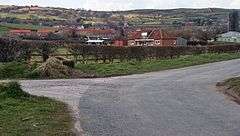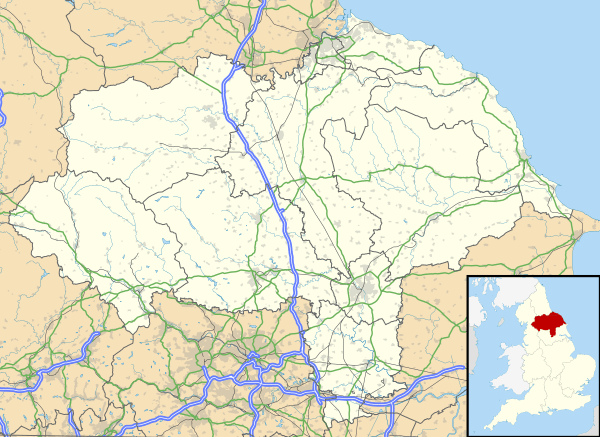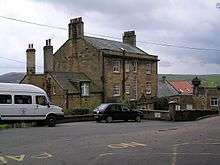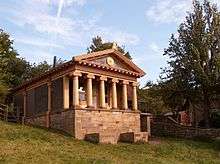Fylingthorpe
Fylingthorpe is a village in Fylingdales, North Yorkshire, England.
| Fylingthorpe | |
|---|---|
 View of the village | |
 Fylingthorpe Location within North Yorkshire | |
| OS grid reference | NZ943050 |
| Civil parish | |
| Ceremonial county | |
| Region | |
| Country | England |
| Sovereign state | United Kingdom |
| Post town | Whitby |
| Postcode district | YO22 |
| Police | North Yorkshire |
| Fire | North Yorkshire |
| Ambulance | Yorkshire |
| UK Parliament | |
Geography
Fylingthorpe is located about 1.1 mi (1.8 km) inland from the coast of the North Sea, and about 0.7 mi (1.1 km) from Robin Hood's Bay, the larger of the two settlements within Fylingdales Parish, between 180 ft (55 m) and 656 ft (200 m) above sea level. The country rises sharply west of the village itself towards Fyling Hall school by about 100 m in 1 km.
The underlying geology is boulder clay.[1]
History
Fylingthorpe, then an agglomeration-type settlement, is reported in the Domesday Book of 1086 as "waste" and non-populated.[1] It came under the jurisdiction of William de Percy who between 1091 and 1096 granted it to Whitby Abbey.
The village was originally only known as Thorpe and in the 13th century as Prestethorpe.[2]
The Fawside family, who originated in Scotland and accompanied King James I, had Thorpe Hall mansion built in 1680. They later changed their name into Farsyde and, as lords of Fylingdales Manor, were involved in various conflicts of political, religious, and military nature. They were also involved in shipping and smuggling.[3]
Fyling Hall railway station on the now defunct Scarborough and Whitby Railway served the nearby school from 1885 to 1965,[4] but the village was nearer to the station at Robin Hood's Bay.[5]
In 1923, the boarding school of Fyling Hall was founded in a Georgian country house near the village. It is still in operation.[6]
Notable buildings


Thorpe Hall, an Elizabethan mansion built by the Fawside family in 1680 and extended twice in the 19th century, now serves as bed and breakfast accommodation.[3]
The Georgian country house of Fyling Hall, built in 1810 and now the home of Fyling Hall School, replaced an earlier hall where in 1632 the politician Sir Hugh Cholmeley was born.
St Stephen's Old Church north of the village, a chapel of ease which contains memorials for shipwrecked sailors, was built in 1821 as a preaching church,[7] replacing a predecessor.[2] It is a Grade I listed building.[8]
The "Pigsty" is an architectural folly south of Fyling Hall, built in the late 19th century as pig stables in a neoclassical style by John Barry, a shipowner and resident of the mansion, and is now rented out as holiday accommodation by the Landmark Trust.[9][10]
References
- Reid, Ann Elizabeth (1987). Settlement and society in north-east Yorkshire A.D. 400 - 1200 (PDF) (Thesis). Durham University. Retrieved 13 June 2017.
- Page, William, ed. (1923). "Parishes:Fylingdales". A History of the County of York North Riding: Volume 2. Victoria County History. British History Online. pp. 534–537. Retrieved 4 September 2010.
- "Thorpe Hall History and the Fawside family". Thorpe Hall. Retrieved 13 June 2017.
- Nick Catford. "Disused Stations: Fyling Hall Station". Retrieved 11 June 2017.
- Catford, Nick. "Disused Stations: Robin Hoods Bay Station". www.disused-stations.org.uk. Retrieved 11 October 2017.
- "Fyling Hall School". Independent Schools Council. Retrieved 13 June 2017.
- "St Stephen's Church, Fylingdales, North Yorkshire". The Churches Conservation Trust. 2017. Retrieved 13 June 2017.
- Historic England. "Church of St Stephen, Fylingdales (1148706)". National Heritage List for England. Retrieved 13 June 2017.
- "Follies" (in German). Retrieved 13 June 2017.
- "Holiday at The Pigsty, Robin Hood's Bay, North Yorkshire". The Landmark Trust. Retrieved 13 June 2017.
Further reading
- Robin Lidster: Robin Hood’s Bay and Fylingthorpe Through Time. Amberley Publishing 2009. 96 pages. ISBN 978-1848686632.